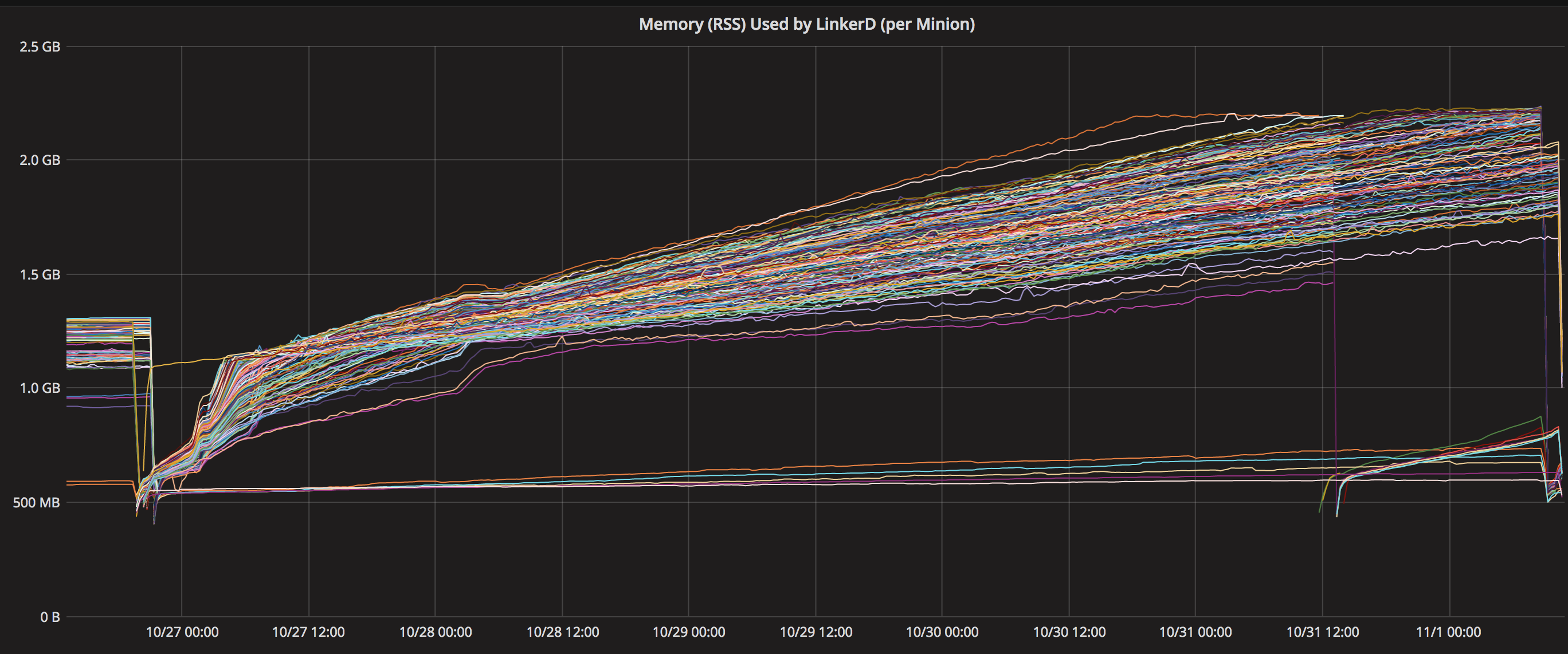OutOfDirectMemoryError errors causing linkerd to fail
See original GitHub issueIssue Type:
- Bug report
- Feature request
What happened: Over a period of days, linkerd memory usage climbs until it reaches a maximum and starts throwing OutOfDirectMemoryError errors
What you expected to happen: OutOfDirectMemoryError errors should not happen
How to reproduce it (as minimally and precisely as possible):
Running linkerd 1.3.0 single instance per host, with namerd on separate hosts. Environment memory overrides: JVM_HEAP_MAX=1024M and JVM_HEAP_MIN=1024M. Let run for days, and monitor process memory usage. Usage increases until errors start occuring:
Memory usage chart (10/27 new VMs running 1.3.0, dips at the end are me restarting linkerd):

Stack trace:
linkerd[2410]: W 1101 14:10:26.714 UTC THREAD42: Unhandled exception in connection with /10.49.154.23:42176, shutting down connection
linkerd[2410]: io.netty.util.internal.OutOfDirectMemoryError: failed to allocate 1048576 byte(s) of direct memory (used: 1037041958, max: 1037959168)
linkerd[2410]: at io.netty.util.internal.PlatformDependent.incrementMemoryCounter(PlatformDependent.java:618)
linkerd[2410]: at io.netty.util.internal.PlatformDependent.allocateDirectNoCleaner(PlatformDependent.java:572)
linkerd[2410]: at io.netty.buffer.PoolArena$DirectArena.allocateDirect(PoolArena.java:764)
linkerd[2410]: at io.netty.buffer.PoolArena$DirectArena.newChunk(PoolArena.java:740)
linkerd[2410]: at io.netty.buffer.PoolArena.allocateNormal(PoolArena.java:244)
linkerd[2410]: at io.netty.buffer.PoolArena.allocate(PoolArena.java:214)
linkerd[2410]: at io.netty.buffer.PoolArena.allocate(PoolArena.java:146)
linkerd[2410]: at io.netty.buffer.PooledByteBufAllocator.newDirectBuffer(PooledByteBufAllocator.java:324)
linkerd[2410]: at io.netty.buffer.AbstractByteBufAllocator.directBuffer(AbstractByteBufAllocator.java:181)
linkerd[2410]: at io.netty.buffer.AbstractByteBufAllocator.directBuffer(AbstractByteBufAllocator.java:172)
linkerd[2410]: at io.netty.buffer.AbstractByteBufAllocator.ioBuffer(AbstractByteBufAllocator.java:133)
linkerd[2410]: at io.netty.channel.DefaultMaxMessagesRecvByteBufAllocator$MaxMessageHandle.allocate(DefaultMaxMessagesRecvByteBufAllocator.java:80)
linkerd[2410]: at io.netty.channel.nio.AbstractNioByteChannel$NioByteUnsafe.read(AbstractNioByteChannel.java:122)
linkerd[2410]: at io.netty.channel.nio.NioEventLoop.processSelectedKey(NioEventLoop.java:645)
linkerd[2410]: at io.netty.channel.nio.NioEventLoop.processSelectedKeysOptimized(NioEventLoop.java:580)
linkerd[2410]: at io.netty.channel.nio.NioEventLoop.processSelectedKeys(NioEventLoop.java:497)
linkerd[2410]: at io.netty.channel.nio.NioEventLoop.run(NioEventLoop.java:459)
linkerd[2410]: at io.netty.util.concurrent.SingleThreadEventExecutor$5.run(SingleThreadEventExecutor.java:858)
linkerd[2410]: at java.util.concurrent.ThreadPoolExecutor.runWorker(Unknown Source)
linkerd[2410]: at java.util.concurrent.ThreadPoolExecutor$Worker.run(Unknown Source)
linkerd[2410]: at com.twitter.finagle.util.BlockingTimeTrackingThreadFactory$$anon$1.run(BlockingTimeTrackingThreadFactory.scala:23)
linkerd[2410]: at java.lang.Thread.run(Unknown Source)
Anything else we need to know?:
Environment:
- linkerd/namerd version, config files: 1.3.0 linkerd and namerd. linkerd config:
admin:
port: 9990
ip: 0.0.0.0
routers:
- protocol: http
label: microservices_prod
dstPrefix: /http
interpreter:
kind: io.l5d.mesh
dst: /$/inet/cwl-mesos-masters.service.consul/4182
experimental: true
root: /microservices-prod
identifier:
- kind: io.l5d.path
segments: 3
- kind: io.l5d.path
segments: 2
- kind: io.l5d.path
segments: 1
servers:
- port: 4170
ip: 0.0.0.0
client:
kind: io.l5d.global
loadBalancer:
kind: ewma
failureAccrual:
kind: io.l5d.consecutiveFailures
failures: 5
requeueBudget:
minRetriesPerSec: 10
percentCanRetry: 0.2
ttlSecs: 10
service:
kind: io.l5d.global
totalTimeoutMs: 10000
responseClassifier:
kind: io.l5d.http.retryableRead5XX
retries:
budget:
minRetriesPerSec: 10
percentCanRetry: 0.2
ttlSecs: 10
- protocol: http
label: proxy_by_host
dstPrefix: /http
interpreter:
kind: io.l5d.mesh
dst: /$/inet/cwl-mesos-masters.service.consul/4182
experimental: true
root: /default
identifier:
- kind: io.l5d.header.token
header: Host
servers:
- port: 4141
ip: 0.0.0.0
- port: 80
ip: 0.0.0.0
- protocol: http
label: proxy_by_path3
dstPrefix: /http
interpreter:
kind: io.l5d.mesh
dst: /$/inet/cwl-mesos-masters.service.consul/4182
experimental: true
root: /default
identifier:
- kind: io.l5d.path
segments: 3
servers:
- port: 4153
ip: 0.0.0.0
- protocol: http
label: proxy_by_path2
dstPrefix: /http
interpreter:
kind: io.l5d.mesh
dst: /$/inet/cwl-mesos-masters.service.consul/4182
experimental: true
root: /default
identifier:
- kind: io.l5d.path
segments: 2
servers:
- port: 4152
ip: 0.0.0.0
- protocol: http
label: proxy_by_path1
dstPrefix: /http
interpreter:
kind: io.l5d.mesh
dst: /$/inet/cwl-mesos-masters.service.consul/4182
experimental: true
root: /default
identifier:
- kind: io.l5d.path
segments: 1
servers:
- port: 4151
ip: 0.0.0.0
telemetry:
- kind: io.l5d.influxdb
-
Platform, version, and config files (Kubernetes, DC/OS, etc): CentOS Linux release 7.4.1708 (Core)
-
Cloud provider or hardware configuration: Google Cloud
Issue Analytics
- State:
- Created 6 years ago
- Comments:48 (26 by maintainers)

 Top Related StackOverflow Question
Top Related StackOverflow Question
@DukeyToo We have a fix up at: https://github.com/linkerd/linkerd/pull/1711 Is it possible to test this branch against your use case?
Quick update for folks watching this issue. We have reproduced a leak and are actively working on a fix. To confirm the leak you are seeing is the same one we have identified, have a look at your
open_streamsmetrics. If they grow over time, that is the leak.